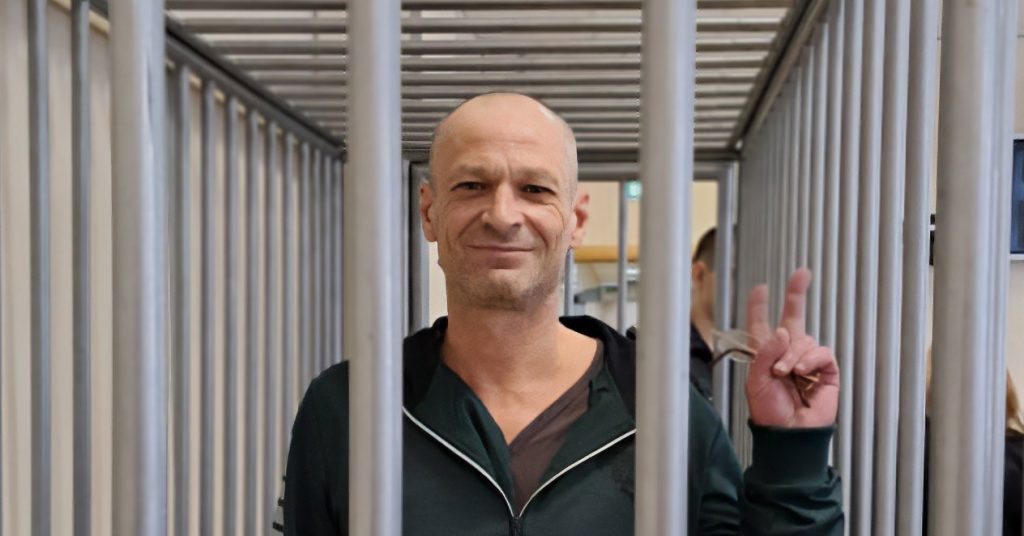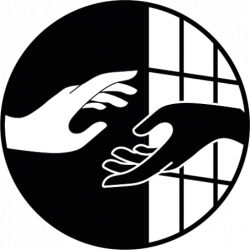
Vladimir Zolotaryov is a taxi driver from Komsomolsk-on-Amur who previously participated in protest actions against Vladimir Putin’s regime and supported opposition politician Alexei Navalny. After Russia’s invasion of Ukraine in February 2022, he fell into depression and began drinking heavily. The situation in the country and the war caused him great anxiety, particularly the prospect of his son, who had reached conscription age, being mobilized. Vladimir felt the need to express his protest, and in June 2022, he set fire to the porch of a Rosgvardiya building. Following the arson, Zolotaryov was arrested. He was 50 years old at the time. Vladimir was charged with “terrorism” and sentenced to 18 years in prison.
Life Before the War
Before the full-scale war, Vladimir Zolotaryov lived a relatively calm life. He worked as a taxi driver and lived with his 72-year-old mother. Periodically, he participated in protests organized by supporters of Alexei Navalny. Vladimir said that Navalny’s ideas resonated with him and that he shared his political stance, believing Navalny to be one of the few openly criticizing the actions of the Russian government.
When Russia launched its full-scale invasion of Ukraine in February 2022, Vladimir sank into a deep depression. He began drinking alone and obsessively reading news about the war. “My drinking binge that began on February 24, 2022, is directly connected to what is happening in Ukraine—the deaths of innocent people deeply affect me emotionally,” he said during an interrogation. His distress was compounded by fears for his son’s future, as he could potentially be mobilized and sent to the front lines.
A Trip to the Forest and House Arrest
On March 9, 2022, after several days of heavy drinking, Zolotaryov decided to go to the forest to isolate himself temporarily, try to overcome his alcohol dependency, and rest in nature. He bought several cans of gasoline, a crowbar, and alcohol from local stores, preparing for the trip. “I bought gasoline at a gas station so I could stay in the forest for a long time until the gasoline ran out,” Vladimir explained. “The crowbar was to cut branches for firewood since the store didn’t have an axe. I’ve previously used a crowbar to cut branches—it’s quite convenient.”
On his way, he was stopped by the police, who suspected he was driving under the influence. According to the investigation, during his detention, a scuffle occurred between Vladimir and the police, during which Zolotaryov allegedly struck Senior Lieutenant Dmitry Feldman in the face with his head. Zolotaryov maintained that the blow was accidental: the police twisted his arms, and as he reflexively pulled back in pain, his head struck the officer’s nose.
Later, during interrogation, Zolotaryov recalled being in an extremely emotional state and possibly yelling something aggressive about the authorities but insisted he had no intention of harming anyone. At that moment, he also spoke to the police about the war in Ukraine, calling Putin a “scoundrel,” shaming the officers for serving a “criminal government,” and expressing regret over the deaths of children in the war. During this emotional outburst, he mentioned that he would like to burn or blow up FSB and Ministry of Internal Affairs buildings but later clarified that these were drunken statements born out of stress and fear for the future.
As a result of this incident, a criminal case was opened against Zolotaryov for “causing violence that does not endanger life to a government representative” (Part 1, Article 318 of the Russian Criminal Code). He was placed under house arrest and had his driver’s license revoked, which meant he could no longer work as a taxi driver.
“I Just Want to Show My Dissent”
Despite being under house arrest and prohibited from leaving his home, Vladimir Zolotaryov decided to carry out a protest. On the evening of June 3, he approached the Rosgvardiya building in Komsomolsk-on-Amur with a 20-liter canister of gasoline he had purchased from a nearby gas station. He poured gasoline on the building’s porch and set it on fire. The large blaze and smoke were captured on video by witnesses.
Zolotaryov did not attempt to flee or hide after the arson. He returned home, went to sleep, and the next day went to the City Hotel, where he drank heavily. The police detained him there.
During interrogations, Zolotaryov admitted to the arson, stating it was a protest against the war in Ukraine. He said he saw no other way to express his disapproval of the government’s policies: “I felt that I could no longer bear it.” He emphasized that the arson was an attempt to draw public attention to the tragedy of the war and to cope with his depression and despair. Vladimir also stressed that he did not want to harm anyone and deliberately chose a time when the Rosgvardiya building was closed, ensuring no one could be hurt.
“I just want to show that I disagree, not to kill or harm anyone. Killing someone would be catastrophic for me,” Zolotaryov said during interrogation.
“How to Protest in Russia Without Ending Up in Prison—I Don’t Know”
Zolotaryov was charged with “committing a terrorist act” (Part 1, Article 205 of the Russian Criminal Code), and this case was combined with the earlier case of “attacking” a police officer. The investigation claimed that Vladimir aimed to destabilize government operations and that the arson was intended to intimidate and destabilize. However, the fire was extinguished quickly, and no one was harmed.
During the investigation, authorities referenced Zolotaryov’s March statements about wanting to set fire to FSB and police buildings. Based on these words, a new case was opened against him for “preparation to commit a terrorist act” (Part 1, Article 30; Part 1, Article 205 of the Russian Criminal Code). The investigation alleged that Zolotaryov had intended to use the crowbar and gasoline found in his car in March to break into and set fire to government buildings.
Vladimir maintained his innocence regarding the second case, asserting that he had taken the crowbar and gasoline solely for his forest trip and that his emotional words were the result of stress and intoxication. “Besides, it’s physically impossible because the FSB and police windows are barred in such a way that even if you break the glass, you can’t pour gasoline inside,” Zolotaryov noted.
The prosecution requested a 17-year sentence for Vladimir Zolotaryov, but the court sentenced him to 18 years. The first five years of this term are to be served in a high-security prison, with the remaining years in a strict-regime penal colony.
The verdict was issued on July 28, 2023, by the First Eastern District Military Court, presided over by Judge Anton Grigoryevich Antonov, with Federal Judges Valery Anatolyevich Andrusov and Yuri Vladimirovich Ukolov. The prosecution was represented by Sergey Nikolaevich Sukhonos from the Khabarovsk Territory Prosecutor’s Office.
“This kind of accusation is utterly unimaginable but completely in line with our state’s nature,” Zolotaryov wrote in a letter to Mediazona.
Zolotaryov did not plead guilty to terrorism charges and claimed his actions were solely motivated by protest against the war in Ukraine. “First and foremost, I needed to clear my conscience. And, of course, draw people’s attention—to show that there are those who disagree. But how to protest in Russia without ending up in prison—I don’t know,” he said in court.
Why We Consider the Sentence Against Vladimir Zolotaryov Unjustified
On March 12, 2022, traffic police stopped Vladimir Zolotaryov, suspecting him of driving under the influence. According to the prosecution, Zolotaryov “assaulted police officers when they attempted to hold him accountable for administrative violations.” However, case materials show that the police engaged Zolotaryov in a provocative conversation. In response, Vladimir, under the influence of alcohol, made several sharp remarks, expressing threats toward police officers and other units of the Ministry of Internal Affairs (MVD) and the Federal Security Service (FSB). These emotional statements formed the basis of charges against Zolotaryov for “preparation to commit a terrorist act” (Part 1, Article 30; Part 1, Article 205 of the Russian Criminal Code). It is essential to note that at the time of his detention, Zolotaryov was intoxicated and provoked into making such remarks.
Among other evidence presented by the prosecution were cans of gasoline and a crowbar found in Vladimir’s car trunk. However, the presence of these items does not, in itself, indicate an intention to commit a “terrorist act.” Instead of conducting a thorough pre-investigation check, the prosecution deemed the drunken statements and discovered items sufficient to build a criminal case. Vladimir consistently maintained that he had no intention of setting fire to government buildings, but the court dismissed his testimony as “fabricated.”
According to Article 205 of the Russian Criminal Code, a terrorist act involves actions that “intimidate the population, create a danger to human life, cause significant property damage, or other serious consequences, with the aim of destabilizing government operations.” However, for actions to be classified as a “terrorist act,” these threats must be real, determined case-by-case based on the place, time, tools, and methods used in the “crime.”
Vladimir Zolotaryov set fire to the Rosgvardiya building in Komsomolsk-on-Amur as a protest against Russia’s invasion of Ukraine. He claimed his act was purely symbolic and not intended to cause harm: “I disagree with the actions of our government and the ‘Special Military Operation.’ It deeply shocked me, and I felt it was necessary to draw attention to this. Words alone don’t lead to understanding. Yes, this way I drew attention and expressed my protest; I didn’t see another way. I only set fire to the porch, not the building itself, and it was in the evening, outside working hours. I had no intent to harm anyone. Ultimately, I realized there are people who understand, but unfortunately, many value silver over their conscience.” Zolotaryov admitted he was deeply emotional about the war in Ukraine and saw no other way to express his dissent.
Based on the above arguments, we do not consider Vladimir Zolotaryov’s actions a “terrorist act” and see no credible evidence of an “attempted terrorist act.” Consequently, the verdict appears unlawful, baseless, and politically motivated.
The human rights project Support for Political Prisoners. Memorial also determined that the criminal case against Zolotaryov was politically motivated and aimed at intimidating society as a whole. According to international criteria, Vladimir Zolotaryov has been recognized as a political prisoner.
Grounds for Recognizing Vladimir Zolotaryov as a Political Prisoner
Vladimir has not admitted guilt and disagrees with the classification of his actions as “terrorism.” His defense appealed the verdict, but the appellate court left it unchanged.
Vladimir Zolotaryov was transferred to a prison in Yeniseysk, Krasnoyarsk Krai. He is to spend the first five years in a high-security prison and the remaining 13 years in a strict-regime penal colony.
Vladimir would appreciate letters from supporters. He is a well-rounded and open individual with interests in science, particularly anthropology, astronomy, and physics, as well as fiction and quality science fiction. In one of his letters, he shared his interest in feminist discourse and books on the subject. Zolotaryov has also spoken about his opposition to animal cruelty and his gradual shift away from consuming animal products. Vladimir is a kind and soulful person—it is easy to find common ground with him.
HOW TO HELP
Address for letters and parcels:
660075, г. Красноярск, ул. Республики, 72, СИЗО-1,
Золотарёву Владимиру Георгиевичу 1972 г.р.
It is possible to send letters through the electronic service «ФСИН-письмо», PrisonMail.Online, РосУзник.
How can I write letters to political prisoners in Russia?



